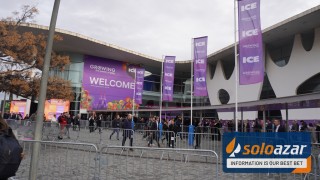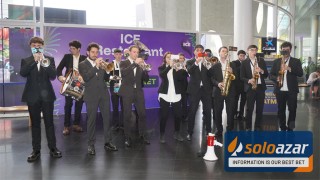ESG & Sustainability in iGaming: Innovations Shaping a Green Revolution
Thursday 17 de April 2025 / 12:00
2 minutos de lectura
(Sofia).- The iGaming industry is beginning to embrace sustainability, integrating Environmental, Social, and Governance (ESG) principles into its daily operations. As consumer expectations shift, companies are rethinking how they manage environmental impact, support communities, and uphold governance standards.

Sustainability in iGaming extends beyond Responsible Gaming practices and donations to ‘green’ charities. It should encompass strategies like green data centres, ethical employment practices, and community support through taxation and investment.
Yet, despite this global shift in business dynamics, most players—and a significant number of industry professionals—are unaware of its impact and the future sustainable practices of iGaming.
What is ESG?
ESG refers to standards for assessing a company's impact on the environment, its relationships with stakeholders, and the strength of its governance structures.
The standards cover three pillars within iGaming that shape how operators run their businesses sustainably:
- Environmental – Energy consumption, carbon footprint, and waste reduction.
- Social – Community engagement, responsible employment, and charitable contributions.
- Governance – Transparency, ethical business practices, and regulatory compliance.
Governments and regulatory bodies worldwide are implementing and embedding more enhanced ESG reporting requirements. iGaming businesses are not exempt from these initiatives; they should begin to examine their internal practices more closely and demonstrate meaningful progress.
Environmental Sustainability in iGaming
Reducing Energy Consumption
Substantial energy is consumed by iGaming platforms. Operators can implement environmental footprint-reducing strategies such as cloud computing, energy-efficient servers and renewable energy sources. At the same time, others take a different approach by adopting water-cooled systems to replace traditional air cooling, cutting power use significantly. Some ambitious companies aim to meet net-zero carbon emissions in the future, while others instead invest in carbon offset programmes to mitigate their environmental impact.
Paperless Operations & Digital Transactions
Digital transactions have already contributed considerably to improving environmental efficiency. A paperless world reduces resource consumption. iGaming operators already use tools such as digital betting slips, electronic Know Your Customer (KYC) processes, and automated compliance reporting.
Other forms of digital processing, such as cryptocurrency and digital wallets, streamline transactions and reduce reliance on traditional banking methods, contributing to sustainability.
Sustainable Game Development
Game developers are also exploring ways to make the industry more sustainable. Some of their endeavours include using recycled materials in hardware manufacturing and optimising game coding to require less processing power.
Social Responsibility in iGaming
The social aspects of ESG primarily focus on community investment, employee well-being, and ethical business practices.
Tax Contributions Supporting Social Programmes
While many iGaming operators and providers contribute independently to social initiatives and charities, many jurisdictions also use tax revenue to fund social benefits.
For example, Brazil’s new gambling regulations mandate that a portion of operators’ ownership must be based within the country, ensuring economic benefits remain local. Tax revenue funds education, healthcare, and social welfare programmes in several regions, helping communities benefit from the sector’s financial success. In Brazil,12% of net revenue will be shared among various social beneficiaries, such as health, education, sports clubs, tourism, and other public services. This includes worthy causes like the Brazilian Paralympic Committee (CPB), the Brazilian Red Cross, and public schools.
Employment & Local Business Support
iGaming operators and providers already contribute to the economy via multiple sectors, from technology and customer support to compliance and marketing. By employing local talent and partnering with small businesses for services, they contribute to regional economic growth. This benefits the local economy and operators who collaborate with local experts, such as the WA.Technology LatAm team.
Charitable Contributions & Community Engagement
iGaming operators and providers often instigate inventive new ways to contribute to society. Many companies will support grassroots charities, organisations, or small local businesses, especially those within the local community near their offices. This ethos of ‘giving back’ builds goodwill and establishes the business as a reputable organisation mindful of sharing prosperity. Some companies support or establish foundations dedicated to responsible gambling education and mental health initiatives, reinforcing their commitment to social responsibility.
Governance: Ensuring Transparency & Compliance
Governance is a serious issue in iGaming. Compliance with regulations, ethical marketing, and fair business practices are social responsibilities and often legal requirements.
Regulatory Compliance & Responsible Gambling
Operators must adhere to stringent regulations, including anti-money laundering (AML) and Know Your Customer (KYC) requirements. Many jurisdictions have also introduced ESG frameworks that encourage transparency in operations, such as the Malta Gaming Authority’s (MGA) voluntary ESG Code of Good Practice.
Fair Play & Ethical Business Practices
AI-driven software that detects fraudulent activity often monitors fair play and ethical business practices, ensuring a fair and ethical environment for players.
Sustainability in Rewards & Loyalty Programmes
Beyond environmental and social measures, sustainability in iGaming extends to customer rewards. Some operators now include eco-friendly incentives, such as charity donations or digital rewards. This approach aligns with broader sustainability goals while maintaining customer engagement. However, sustainability for casinos can also refer to sustainability in promotions, meaning operators must make rewards achievable and realistic. Loyalty programs that offer rewards that no one will ever receive or will never be able to provide because they far exceed what is possible are not ethical, fair, or compliant.
The Future of ESG in iGaming
ESG principles continue to be integrated into standard practice. Still, the lack of standardised reporting, differing regulations across jurisdictions, and the need for continued investment in green technologies require ongoing effort.
Operators and providers prioritising ESG will benefit from enhanced brand reputation, stronger regulatory relationships, and increased appeal to socially conscious players, potential collaborators, and clients.
As sustainability becomes a defining factor in business success, iGaming companies must continue refining their approach to remain competitive in an increasingly regulated and responsible industry.
By adopting sustainable practices, supporting communities, and ensuring strong governance, iGaming companies are shaping a greener, more ethical future.
Categoría:Gaming
Tags: Sin tags
País: Bulgaria
Región: EMEA
Event
ICE Barcelona 2026
19 de January 2026
Nadia Popova from EGT on ICE Barcelona 2026:"The new concept of our stand made a strong impression on visitors"
(Barcelona, SoloAzar Exclusive).- In this post-event interview from Barcelona, Nadia Popova, EGT’s Chief Revenue Officer and VP Sales & Marketing shares insights on the company’s standout presence, its “All eyes on us” stand concept, key product highlights, and the strategic partnerships forged at ICE Barcelona 2026.
Friday 20 Feb 2026 / 12:00
Luz Beatriz Jaramillo Serna of 21Viral: “Our presence at ICE Barcelona 2026 was exceptionally positive”
(Barcelona, SoloAzar Exclusive).- Following her participation at ICE Barcelona 2026, Luz Beatriz Jaramillo Serna, Head of Business Development, Marketing and Sales for Latin America at 21Viral, analyzes the commercial impact of the event, the trends set to shape the industry’s direction, and the company’s strategic priorities to consolidate growth across the region and new regulated markets.
Monday 16 Feb 2026 / 12:00
Toni Karapetrov from Habanero on ICE Barcelona 2026: Regulated Growth, Localization and Strategic Expansion Drive 2026 iGaming Strategy
(Barcelona, Exclusive SoloAzar).- In this interview, Toni Karapetrov, Head of Corporate Communications at Habanero, shares insights from ICE Barcelona 2026, highlighting premium content innovation, high-level industry engagement, key iGaming trends such as localization and gamification, and the company’s strategic focus on regulated market expansion and sustainable growth in 2026.
Friday 13 Feb 2026 / 12:00
SUSCRIBIRSE
Para suscribirse a nuestro newsletter, complete sus datos
Reciba todo el contenido más reciente en su correo electrónico varias veces al mes.



















